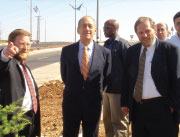Man on a Mission
| October 2, 2017
Even with nearly three decades of political experience Yitzchak Pindrus still doesn’t consider himself a politician — nor does he come across as one. His demeanor suggests a cross between a mischievous Yerushalmi cheder yingel a self-effacing American gentleman and a shrewd Israeli army commander (Photos: Shlomi Cohen)
T he fall of 2008 found Rabbi Yitzchak Pindrus former mayor of Beitar Illit in the United States fundraising yet again on behalf of the residents of Beitar who had voted him out of office less than a year earlier. When he landed at Ben-Gurion Airport just a few days before Rosh Hashanah his phone rang. A member of Rav Yosef Shalom Elyashiv’s household was calling to inform him that the posek hador — whose guidance Rabbi Pindrus had followed faithfully since attending his nightly shiur many years earlier — had to speak to him urgently.
Early that afternoon Reb Yitzchak was already seated in the Rav’s home.
At the time Uri Lupoliansky Jerusalem’s chareidi mayor was leaving politics and the leading candidates to replace him as mayor were longtime chareidi politician Meir Porush and nonreligious businessman Nir Barkat.
“It looks like Yerushalayim will soon have a nonreligious mayor ” Rav Elyashiv predicted. “This city needs you. I don’t know how good it is for you personally though. Can you come?”
The request was far from simple. In order to run for the Jerusalem city council Pindrus would have to be a resident of the city for 34 days prior to the municipal election. Other politicians had circumvented that regulation by setting up an official address in the city in which they were running for office but not actually residing there until the eve of the election. That wasn’t Pindrus’s style however. In order to avoid any hint of chillul Hashem he would have to pack up nearly 20 years’ worth of belongings and memories and move his family — who were still reeling from his loss in Beitar — to Jerusalem within a week.
“If the Rav says I should come then I have to come ” Pindrus answered.
“Nu nu ” Rav Elyashiv responded.
“That was the way a conversation went with Rav Elyashiv ” Reb Yitzchak recounts nine years later. “Thirty seconds. Straight to the point.”
And move they did — on Tzom Gedalyah exactly 34 days before the election.
“It took my family a long time to recover from the move ” Pindrus remarks. “We left our house and our community and ran into Jerusalem where I had to work with some of the same people who had orchestrated my defeat in Beitar. But Rav Elyashiv said to do it so I did.”
Even with nearly three decades of political experience Yitzchak Pindrus still doesn’t consider himself a politician — nor does he come across as one.

“I didn’t ask you to finance the road. I’m the mayor. I sign the checks. I have to deal with the funding. You get a tractor and start digging”
He speaks confidently but without a trace of glibness and his demeanor suggests a cross between a mischievous Yerushalmi cheder yingel a self-effacing American gentleman and a shrewd Israeli army commander.
There is a genuineness to his smile and a sparkle in his eye as he talks about causes that are important to him such as building classrooms for chareidi schools. Sitting with him in a room of people you would never guess that he was the one who catapulted Beitar from a tiny development town into a bustling city. He has no interest in overpowering anyone in conversation or being the alpha person in the room. (Excerpted from Mishpacha Issue 680)
Oops! We could not locate your form.

